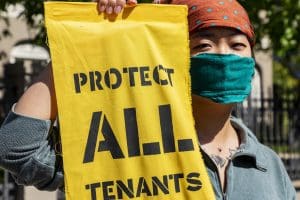LGBTQ people of color are facing a housing crisis because of the pandemic
Nearly 40% have had their work hours reduced and 14% have asked for delays in making rent payments.

People of color in the LGBTQ community are more likely to ask for delays in rent payments, have their work hours reduced, or say they are unemployed than their white counterparts, according to a report released Thursday by the Human Rights Campaign.
Experts say the coronavirus pandemic could put even more LGBTQ people of color at risk of homelessness than already were before it started.
The report, based on polling conducted between April 16 and May 6 says, for example, that 14% of LGBTQ people of color have asked for delays in paying their rent because of the pandemic compared to 8% of LGBTQ white people who have done so and 7% of the general population. The coronavirus has been responsible for 38% of LGBTQ people of color seeing a reduction in their work hours, while 29% of LGBTQ white people and 24% of the general population have experienced the same.
And while 13% of the general population is unemployed during the pandemic, 22% of LGBTQ people of color report that they are without work.
Sharita Gruberg, director of policy for the LGBTQ Research and Communications Project at the Center for American Progress, said there were already “glaring” disparities between LGBTQ people and cisgender straight people in rates of housing insecurity before the pandemic. The disparities are even greater for LGBTQ people of color.
Data collected by the Center for American Progress in 2017 has shown that LGBTQ people are twice as likely to rely on federal housing assistance than non-LGBTQ people. LGBTQ people of color were three times more likely to rely on this assistance than white LGBTQ people. Trump administration actions — such as proposing to roll back the Department of Housing and Urban Development’s Equal Access Rule protecting “equal access for individuals in accordance with their gender identity in programs and shelter funded under programs administered by HUD’s Office of Community Planning and Development,” and enabling discrimination on the pretext of protecting “religious liberty” — will exacerbate the problem, Gruberg said.
“They’ve assaulted the key supports people need to live, such as SNAP benefits, and they’re attacking fair housing rules,” Gruberg said. “A lot of these really important safeguards that LGBT people of color were disproportionately in need of have been undermined and rolled back. We also see the administration is removing clear prohibitions on discrimination, including grant programs.”
Although HUD’s rule allowing shelters to refuse to safely house transgender people hasn’t been finalized, Gruberg said that doesn’t mean the administration isn’t already dismantling access to safe shelters. Gruberg said that the center’s research has found that only a third of shelters are willing to safely house transgender women.
“They scrapped a requirement that shelters post a notice that trans women have rights, and without these notices, you don’t have an assurance that the place that you’re going to is safe. … You have the Equal Access Rule on the books, but we haven’t had indication HUD is providing technical assistance to shelters or informing people of their rights or investigating complaints or violations,” Gruberg said.
The Human Rights Campaign report builds on earlier research that focuses on the economic status of LGBTQ people in general. That earlier data showed that the pandemic has hit the entire LGBTQ community hard, with 30% of LGBTQ people having their work hours reduced compared to 22% of the general population earlier in April, and a larger share of LGBTQ people cutting back on spending than were straight and cisgender people. LGBTQ people are already more likely to live in poverty, due, a recent study noted, to “a range of contributors to elevated rates of poverty among [them], including lower educational attainment, unemployment, poor health, and disability.”
The Human Rights Campaign’s analysis of 2018 General Social Survey data found the five industries where LGBTQ adults were more likely to work — restaurants and food services, hospitals, K-12 education, higher education, and retail — have all been greatly affected by the pandemic.
While Human Rights Campaign is continuing to conduct research on the economic impact of the pandemic on LBGTQ people, the organization and other advocacy groups, along with lawmakers across the country, are demanding more data collection on the health and economic risks of the pandemic specific to the LGBTQ community.
Published with permission of The American Independent Foundation.
Recommended

Biden calls for expanded child tax credit, taxes on wealthy in $7.2 trillion budget plan
President Joe Biden released his budget request for the upcoming fiscal year Monday, calling on Congress to stick to the spending agreement brokered last year and to revamp tax laws so that the “wealthy pay their fair share.”
By Jennifer Shutt, States Newsroom - March 11, 2024
December jobs report: Wages up, hiring steady as job market ends year strong
Friday’s jobs data showed a strong, resilient U.S. labor market with wages outpacing inflation — welcome news for Americans hoping to have more purchasing power in 2024.
By Casey Quinlan - January 05, 2024
Biden’s infrastructure law is boosting Nevada’s economy. Sam Brown opposed it.
The Nevada Republican U.S. Senate hopeful also spoke out against a rail project projected to create thousands of union jobs
By Jesse Valentine - November 15, 2023








































































